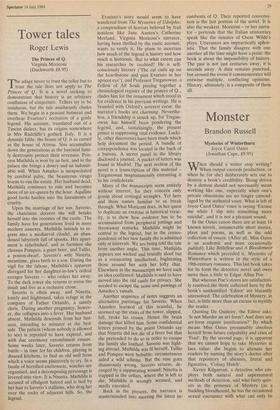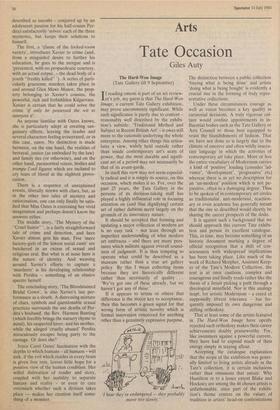Monster
Brandon Russell
Mysteries of Winterthurn Joyce Carol Oates (Jonathan Cape, £9.95) When should a writer stop writing? When output exceeds production, or when he (or she) deliberately sets out to destroy a book's credibility. Being driven by a demon should not necessarily mean working like one, expecially when one's private obsessions are no longer camouf- laged by the authorial voice. What is left of Joyce Carol Oates' voice is saying 'Excuse me while I slip into something more suicidal', and it is not a pleasant sound.
In the Oates canon there are at least 14 known novels, innumerable short stories, plays and poems, as well as the odd collection of essays. (After all, Miss Oates is an academic and must occasionally publish). Like Bellefleur and A Bloodsmoor Romance which preceded it, Mysteries of Winterthurn is written in the style of a 19th-century romance. This last book takes for its form the detective novel and owes more than a little to Edgar Allan Poe.
But whereas Poe's stores are satisfactori- ly resolved,the three collected here by the book's unidentified 'Editor' are blatantly unresolved. The celebration of Mystery, in fact, is little more than an excuse to mystify the reader.
Quoting De Quincey, the Editor asks: `Is not Murder an art-form? And does any art-form require justification?' By which means Miss Oates presumably absolves herself from future culpability and cries of `Foul'. By the second page, it is apparent that we cannot hope to take Mysteries at face value: she begins to alienate her readers by naming the story's doctor after that repository of alienists, literal and figurative, `Colney Hatch'.
Xavier Kilgarvan, a detective who em- ploys both natural and supernatural methods of detection, and who fairly quiv- ers in the presence of Mystery (as a budding bloodhound, he has the occasional sexual encounter with what can only be described as succubi - conjured up by an adolescent passion for his half-cousin Per- dita) satisfactorily 'solves' each of the three mysteries, but keeps their solutions to himself.
The first, a 'classic of the locked-room variety', introduces Xavier to crime (and, from a misguided desire to further his education, he goes to the morgue and is 'presented, with no propaedeutic courtesy, with an actual corpse, - the dead body of a youth "freshly killed" '). A series of parti- cularly gruesome murders takes place in and around Glen Mawr Manor, the prop- erty belonging to Xavier's cousins, the powerful, rich and forbiddden Kilgarvans. Xavier is certain that he could solve the crime 'if only he possessed the wit to interpret it'.
As anyone familiar with Oates knows, she is particularly adept at creating san- guinary effects, leaving the reader and several characters feeling eviscerated, or in this case, eaten. No distinction is made between, on the one hand, the realities of betrayal, justice (as embodied by the law) and family ties (or otherwise), and on the other hand, paranormal voices, bodies and trompe l'oeil figures which are inclined to cry tears of blood at the slightest provo- cation.
There is a sequence of unexplained events, liberally strewn with clues, but, as in the other two tales of mystery and ratiocination, one can only finally be satis- fied that Miss Oates is exercising her vivid imagination and perhaps doesn't know the answers either.
The middle story, 'The Mystery of the "Cruel Suitor" ', is a fairly straightforward tale of crime and detection, and here Xavier almost gets his man. Five 'mere factory-girls of the lowest social caste' are butchered in an excess of sexual and religious zeal. But what is at issue here is the nature of identity. And weaving around Xavier's efforts to capture a 'murderer' is his developing relationship with Perdita - something of an elusive spectre herself.
The concluding story, 'The Bloodstained Bridal Gown', is also Xavier's last per- formance as a sleuth. A distressing mixture of clues, symbols and questionable sexual practices surrounds the axe deaths of Per-. dita's husband, the Rev. Harmon Bunting' (which forcibly brings the nursery rhyme to mind), his suspected lover, and his mother, while the alleged 'cruelly abused' Perdita miraculously escapes being party to the carnage. Or does she?
Joyce Carol Oates' fascination with the depths to which humans - all humans - will sink, if the evil which resides in every brain is given free rein, leaves little hope for a positive view of the human condition. Her wilful dislocation of reader and story, coupled with her inability to separate fantasy and reality - or even to care overmuch whether such a division takes place — makes her creation itself some- thing of a monster.















































 Previous page
Previous page